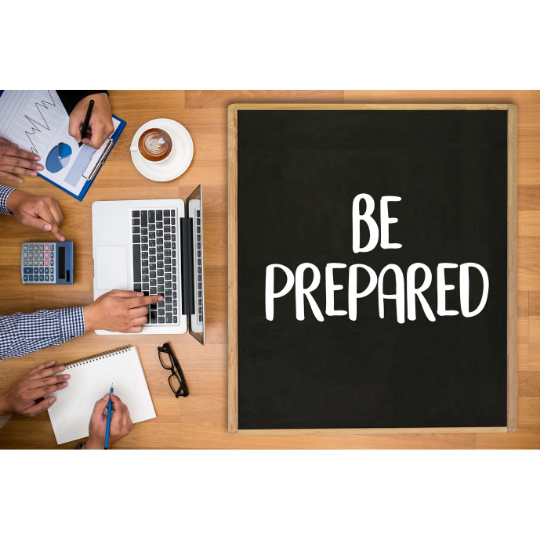
If you’re racing through your day struggling to manage your appointments and be present with your clients; if you’re stuck in your head worrying if you have enough clients, or whether you know enough; if you’re trying to get a lot done and procrastinating or experiencing overwhelm, then this episode is for you.
I’m interviewing Dr Joel Bennett, PhD, CWP, CEO of Organizational Wellness & Learning Systems (OWLS), whose mission is to catalyse healthy cultures and communities from the inside out with science. OWLS programs, many tested in clinical trials, have reached over 250,000 workers.
As somebody who totally knows this from lived experience, I want to invite you to think about what being prepared creates for you, and how to do it in a way that doesn’t sabotage your success.
A lot of people talk about needing to be fully prepared before they launch their business, or to be totally ready before they take action in some area of their life. But what does getting prepared actually mean? It’s like the ubiquitous “I need to get organised” statement that people say.
When I question my clients on this, they’re often not very clear on what it means to get prepared. They’re often not really sure about what getting organised means or when enough is enough. So I invite you to think about that right now and to get some clarity around the specific things that you must do to be prepared enough to take action in some area.
I can give you a few ideas to get you started.
In business, getting prepared means you have done enough market research to define a viable niche.
Logistically you need to have a business number set up, a separate bank account, a LinkedIn profile set up, and to have clarity on a core service you will sell and the benefits of that service.
You need to know what you’re charging and how you will collect money.
You need documentation to run that service, and you need a marketing plan to start reaching customers and building your professional networks.

If you have those things then you are prepared.
Even though that’s a business example, you can follow the same process for life.
For example, let’s say you’ve been studying something and you need to know whether you are prepared enough and ready to sit the exam.
So in this case, you might have read the textbook a couple of times, you might have answered the study questions, you might have done some practice practical sessions, and you have reached a point where you sense you know the answers when you hear or read certain questions being asked.
On paper, for both of these examples, it looks like you’re organised and prepared.
So here’s the other half of the equation. Logistically you’ve ticked all the boxes, but do you feel ‘ready’ to take action, in terms of your confidence, your motivation and your energy?
Being prepared is one thing, but feeling ready is another.
If you have ticked all of the logistical boxes but you’re not feeling very confident or sure about your next steps or whether they will be successful, then there is some mindset work that you might need to do and some limiting beliefs that you need to overcome before you can actually start taking action.
I see this a lot in students studying health and wellness coaching, but also in people who’ve made any sort of change in their lives.

I’ve seen people lose weight in an 8 or 12-week program, and then not feel ready to make lasting behaviour change and want to go back to their old ways.
I have seen people get study completed and get everything ready to set up a business, and then back away from it because they lack the confidence in themselves or their knowledge of this skill to start the ball rolling.
Any sort of change in a new direction requires you to change your identity. This isn’t an overnight thing.
The first critical step to changing your identity is developing the belief that you can become a different sort of person.
This is a hard step, but a very important one. This belief in your ability to become successful is required to find the motivation to get started and to persist, even when things are hard.
You need to draw deep on your strengths and get support and create an environment of success to persist and succeed no matter what.
If you’re a long-time listener of my podcast, you might recall me telling the story of my motorbike trip across Australia. A key point in that story is that everybody I told about the coming trip either laughed at me or told me I was an idiot. Nobody was backing me to do that trip. My boyfriend at the time thought I could do it, my two sisters were neutral and said please be careful, but everybody else tried to talk me out of it and told me that I couldn’t do it. Luckily I had enough self-belief that I could ride a motorbike through all sorts of terrain that I had never experienced and get to the other side and return unscathed.
You can see how easy it could have been in that situation to let myself be talked out of the trip. I was terrified about it, having never ridden a motorbike before in my life and only having just got my licence.
But while I was vulnerable to the opinion of all the ’nay-sayers’ around me, I was still able to imagine myself persisting through the difficult times, using the support of my boyfriend at the time and my mental strengths and skills, and physical strength program I’d developed and used to get me to the other side.
While this was a physically- and mentally demanding trip for me with a risk of injury or accident, many of the things that we are terrified of doing in life are actually not life-or-death situations.
In many cases, the consequences of failure are a lot less than what we make them out to be.
I had a business coaching client once who booked a coaching session with me but could not take any action until she had spoken to her supervisor at work about her plans to build a business in the background. She couldn’t even bring herself to do market research!
I had a weight loss client who wouldn’t start making any progress in her journey until after her one-week holiday overseas, which was 6 weeks away.
So to answer the question, of when will you be ready, I suspect it has more to do with making a decision, waiting for something to occur, picking a start date, and finding the courage and support you need to take action and get traction with your new venture – whatever it is.
In my example of the motorbike trip, I mentioned that I was relying on the support of my boyfriend at the time, my own strengths, and my own physical and mental preparation.
The question is for you now, what and who will help you on your journey?
What are the character strengths that you have that will help you through the difficult parts more easily?
What are the strengths and skills you bring to the project that will ensure your success or at least give you confidence in some areas?
What sort of mental and/or physical preparation will you need to do?
Who are the people you need to rally around you and help you to stay motivated, to brainstorm ideas, to download to, and troubleshoot problems as they come up?

I’ve never heard of any great success being achieved by one person completely on their own. If you know of one, please let me know because I would be very interested to hear that story.
Let’s bring these elements together for a moment and talk about your platform for action.
Whatever your project is, whatever the thing is that you wish to do, there are going to be some logistical aspects you need to complete to be prepared.
What are those things? Write a list.
Now, there are going to be some mental or self-confidence aspects you need to work on before you feel ready to start.
What is the decision you need to make?
What do you need to commit to?
What do you need to believe in advance?
Why is that important to you?
Finally, there are the strengths and supports you need to put in place as your backstop to help you be consistent and persistent.
What are those strengths?
How will you draw on them?
Who are the people who will help you?
How will they help you?
I encourage you to put these things into a plan with specific activities scheduled into your calendar.
When you have all of your ducks in a row, you will finally be prepared and feel ready to take action and get traction.
Today, we’ve really dug into the idea of ‘getting prepared’ but behind that, ‘being ready’ to take action.
Whether it’s your business or your life, you certainly need to tick a few boxes but you also need to manage your thoughts, get support and make some commitment to when and how you will take your first steps.
A lot of people give up before they even start, even though the consequences are often not exactly life or death.
The worst that can happen to you is an emotion.
If you can just do enough to get started, then it might free you up to work and live on purpose and do what you were meant to be doing in the world.
I invite you to reach out if you need support for this – it’s exactly the work we do in the Passion to Profit Program.
Understanding who you are and what you need will allow your business to thrive! If you’re truly ready to break old habits and get out of the rut I encourage you to check out the Habitology membership.
Learn more here: